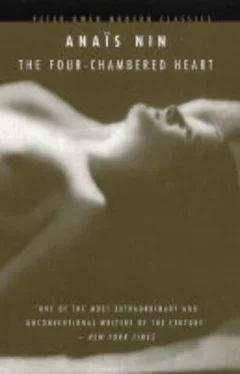Anaïs Nin - The Four-Chambered Heart
Здесь есть возможность читать онлайн «Anaïs Nin - The Four-Chambered Heart» весь текст электронной книги совершенно бесплатно (целиком полную версию без сокращений). В некоторых случаях можно слушать аудио, скачать через торрент в формате fb2 и присутствует краткое содержание. Год выпуска: 2004, ISBN: 2004, Издательство: Peter Owen Limited, Жанр: Классическая проза, Эротические любовные романы, на английском языке. Описание произведения, (предисловие) а так же отзывы посетителей доступны на портале библиотеки ЛибКат.
- Название:The Four-Chambered Heart
- Автор:
- Издательство:Peter Owen Limited
- Жанр:
- Год:2004
- ISBN:9780720611557
- Рейтинг книги:3 / 5. Голосов: 1
-
Избранное:Добавить в избранное
- Отзывы:
-
Ваша оценка:
- 60
- 1
- 2
- 3
- 4
- 5
The Four-Chambered Heart: краткое содержание, описание и аннотация
Предлагаем к чтению аннотацию, описание, краткое содержание или предисловие (зависит от того, что написал сам автор книги «The Four-Chambered Heart»). Если вы не нашли необходимую информацию о книге — напишите в комментариях, мы постараемся отыскать её.
The Four-Chambered Heart — читать онлайн бесплатно полную книгу (весь текст) целиком
Ниже представлен текст книги, разбитый по страницам. Система сохранения места последней прочитанной страницы, позволяет с удобством читать онлайн бесплатно книгу «The Four-Chambered Heart», без необходимости каждый раз заново искать на чём Вы остановились. Поставьте закладку, и сможете в любой момент перейти на страницу, на которой закончили чтение.
Интервал:
Закладка:
“Our affair lasted…lasted for the duration of an elevator ride! And I don’t mean that symbolically either! We took such a violent fancy to each other, the kind that will not last, but will not wait either. It was cannibalistic, and of no importance, but it had to be fulfilled once. Circumstances were against us. We had no place to go. We wandered through the streets, we were ravenous for each other. We got into an elevator, and he began to kiss me… First floor, second floor, and he still kissing me, third floor, fourth floor, and when the elevator came to a standstill, it was too late…we could not stop, his hands were everywhere, his mouth… I pressed the button wildly and went on kissing as the elevator came down… When we got to the bottom it was worse… He pressed the button and we went up and down, up and down, madly, while people kept ringing for the elevator…”
She laughed again, with her entire body, even her feet, marking the rhythm of her gaiety, stamping the ground like a delighted spectator, while her strong thighs rocked the chair like an Amazon’s wooden horse.
One evening while Djuna was waiting for Rango at the barge, she heard a footstep which was not the watchman’s and not Rango’s.
The shadows of the candles on the tarpapered walls played a scene from a Balinese theatre as she moved toward the door and called: “Who’s there?”
There was a complete silence, as if the river, the barge, and the visitor had connived to be silent at the same moment, put a tension in the air which she felt like a vibration through her body.
She did not know what to do, whether to stay in the room and lock the door, awaiting Rango, or to explore the barge. If she stayed in the room quietly and watched for his coming, she could shout a warning to him out of the window, and then together they might corner the intruder.
She waited.
The shadows on the walls were still, but the reflections of the lights on the river played on the surface like a ghost’s carnival. The candles flickered more than usual, or was it her anxiety?
When the wood beams ceased to creak, she heard the footsteps again, moving toward the room, cautiously but not light enough to prevent the boards from creaking.
Djuna took her revolver from under her pillow, a small one which had been given to her and which she did not know how to use.
She called out: “Who is there? If you come any nearer, I’ll shoot.”
She knew there was a safety clasp to open. She wished Rango would arrive. He had no physical fear. He feared truth, he feared to confront his motives, feared to face, to understand, to examine in the realm of feelings and thought, but he did not fear to act, he did not fear physical danger. Djuna was intrepid in awareness, in painful exposures of the self, and dared more than most in matter of emotional surgery, but she had a fear of violence.
She waited another long moment, put again the silence was complete, suspended.
Rango did not come.
Out of exhaustion, she lay down with her revolver in hand.
The doors and windows were locked. She waited, listening for Rango’s uneven footsteps on the deck.
The candles burnt down one by one, gasping out their last flame, throwing one last long, agonized skeleton on the wall.
The river rocked the barge.
Hours passed and Djuna fell into a half sleep.
The catch of the door was gradually lifted off the hinge by some instrument or other and Zora stood at the opened door.
Djuna saw her when she was bending over her, and screamed.
Zora held a long old-fashioned hatpin in her hand and tried to stab Djuna with it. Djuna at first grasped her hands at the wrists, but Zora’s anger gave her greater strength. Her face was distorted with hatred. She pulled her hands free and stabbed at Djuna several times blindly, striking her at the shoulder, and then once more, with her eyes wide open, she aimed at the breast and missed. Then Djuna pushed her off, held her.
“What harm have I done you, Zora?”
“You forced Rango to join the party. He’s trying to become someone now, in politics, and it’s for you. He wants you to be proud of him. With me he never cared; he wasn’t ashamed of his laziness… It’s your fault that he is never home… Your fault that he’s in danger every day.”
Djuna looked at Zora’s face and felt again as she did with Rango, the desperate hopelessness of talking, explaining, clarifying. Zora and Rango were fanatics.
She shook Zora by the shoulders, as if to force her to listen and said: “Killing me won’t change anything, can’t you understand that? We’re the two faces of Rango’s character. If you kill me, that side of him remains unmated and another woman will take my place. He’s divided within himself, between destruction and construction. While he’s divided there will be two women, always. I wished you would die, too, once, until I understood this. I once thought Rango could be saved if you died. And here you are, thinking that I would drive him into danger. He’s driving himself into danger. He is ashamed of his futility. He can’t bear the conflict of his split being enacted in us before his eyes. He is trying a third attempt at wholeness. For his peace of mind, if you and I could have been friends it would have been easier. He didn’t consider us, whether or not we could sincerely like each other. We tried and failed. You were too selfish. You and I stand at opposite poles. I don’t like you, and you don’t like me either; even if Rango did not exist you and I could never like each other. Zora, if you harm me you’ll be punished for it and sent to a place without Rango… And Rango will be angry with you. And if you died, it would be the same. He would not be mine either, because I can’t fulfill his love of destruction…”
Words, words, words…all the words Djuna had turned in her mind at night when alone, she spoke them wildly, blindly, not hoping for Zora to understand, but they were said with such anxiety and vehemence that aside from their meaning Zora caught the pleading, the accents of truth, dissolving her hatred, her violence.
At the sight of each other their antagonism always dissolved. Zora, faced with the sadness of Djuna’s face, her voice, her slender body, could never sustain her anger. And Djuna faced with Zora’s haggard face, limp hair, uncontrolled lips, lost her rebellion.
Whatever scenes took place between them, there was a sincerity in each one’s sadness which bound them too.
It was at this moment that Rango arrived, and stared at the two women with dismay.
“What happened? Djuna, you’re bleeding!”
“Zora tried to kill me. The wounds aren’t bad.”
Djuna hoped once more that Rango would say, “Zora is mad,” and that the nightmare would cease.
“You wanted us to be friends, because that would have made it easier for you. We tried. But it was impossible. I feel that Zora destroys all my efforts to create with you, and she thinks I sent you into a dangerous political life… We can never understand each other.”
Rango found nothing to say. He stared at the blood showing through Djuna’s clothes. She showed him that the stabs were not deep and had struck fleshy places without causing harm.
“I’ll take Zora home. I’ll come back.”
When he returned he was still silent, crushed, bowed. “Zora has moments of madness,” he said. “She’s been threatening people in the street lately. I’m so afraid the police may catch her and put her in an institution.”
“You don’t care about the people she might kill, do you?”
“I do care, Djuna. If she had killed you I don’t think I could ever have forgiven herBut you aren’t angry, when you have a right to be. You’re generous and good…”
“No, Rango. I can’t let you believe that. It isn’t true. I have often wished Zora’s death, but I only had the courage to wish it… I had a dream one night in which I saw myself killing her with a long old-fashioned hatpin. Do you realize where she got the idea of the hatpin? From my own dream, which I told her. She was being more courageous, more honest, when she attacked me.”
Читать дальшеИнтервал:
Закладка:
Похожие книги на «The Four-Chambered Heart»
Представляем Вашему вниманию похожие книги на «The Four-Chambered Heart» списком для выбора. Мы отобрали схожую по названию и смыслу литературу в надежде предоставить читателям больше вариантов отыскать новые, интересные, ещё непрочитанные произведения.
Обсуждение, отзывы о книге «The Four-Chambered Heart» и просто собственные мнения читателей. Оставьте ваши комментарии, напишите, что Вы думаете о произведении, его смысле или главных героях. Укажите что конкретно понравилось, а что нет, и почему Вы так считаете.












